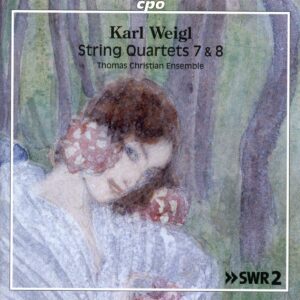The chamber and orchestral works of Karl Weigl (1881-1949) have been gradually finding their way onto recordings, including the last two of his eight string quartets, recorded here for the first time, so far as I know. The harmonic content and polished workmanship of his style relate to other keepers of the Austrian/German fin-de-siècle Romantic flame—composers such as Joseph Marx, Franz Schmidt, and Alexander von Zemlinsky—although Weigl certainly goes his own expressive way.
The Seventh quartet’s first movement mirrors the chromatic contrapuntal turbulence typifying early Schoenberg. Its Allegro molto is a Scherzo packed with jagged rhythmic motives that defy one to identify where the downbeats are without reference to a score, along with intimations of country dances and lyrical passages that simper without slobbering. I like the Adagio’s sustained austerity of mood and the haunting use of col legno techniques, although the music possibly goes on too long for what it has to say. Chugging momentum dominates the Finale, with welcome moments of tuneful respite (Dvorák relieving Prokofiev for a spell!).
If anything, the Eighth quartet proves more consistently gripping, in terms of both content and the Thomas Christian Ensemble’s fervent yet disciplined execution. The unsettled fugal writing holds your attention and keeps you guessing, yet the D major key center ultimately triumphs in the pulverizing final measures. Much of the Andante features slow, threadbare lines that gently brush against one another, although the thick and gnarly climax derives from the early Alban Berg playbook.
The booklet annotator likens the Scherzo’s pizzicato writing and syncopated accents to “a drunken relative at a wedding reception”. I actually hear premonitions of what Shostakovich would be doing a few years later. The fourth movement begins with a harmonically ambivalent Adagio that soon accelerates into an Allegro featuring a motive characterized by relentless dotted rhythmic activity. It’s good to have such excellent performances of neglected yet worthy works, and one hopes that the Christian Ensemble will consider recording Weigl’s six earlier quartets. However, listeners new to Weigl should start with his 1945 Symphony No. 5 (the “Apocalyptic”) in order to fully experience this composer’s coloristic range and communicative power.
































